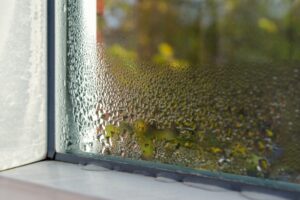 Relative humidity during the summers in Toronto is often extreme. The July daily average is 82% relative humidity, which is 22% higher than what’s already considered high humidity. The increase in moisture in the air is a cause of discomfort on hot days, but high humidity is also a major concern for commercial buildings. Not only do commercial facilities need to worry about comfort levels indoors, they also have concerns about the damage high moisture levels can do to equipment and property and how it can affect process.
Relative humidity during the summers in Toronto is often extreme. The July daily average is 82% relative humidity, which is 22% higher than what’s already considered high humidity. The increase in moisture in the air is a cause of discomfort on hot days, but high humidity is also a major concern for commercial buildings. Not only do commercial facilities need to worry about comfort levels indoors, they also have concerns about the damage high moisture levels can do to equipment and property and how it can affect process.
Humidity control inside a commercial facility is much trickier than in a residential home. A house can sometimes deal with humidity using a standard AC that’s the right size for the space, or a whole-house dehumidifier. With commercial facilities, humidity control is the job of the entire HVAC system—and this is a place where experienced commercial HVAC professionals can make a huge difference. Especially pros like ours, who get to know our clients’ equipment and facilities in detail so we can deliver the customized work necessary.
What’s Involved in Commercial Humidity Control
Reining in high humidity in a commercial space meets three goals: maintain comfortable working conditions, protect the health and safety of people in the facility, and to protect the facility itself and the equipment in it. Depending on the type of facility you run, one of these may be more important than others. For example, precision control may be critical to ensure proper manufacturing in a plant, while a retail environment will be primarily concerned with comfort to prevent customers from leaving.
HVAC System Design
The most important humidity control method is the design of the facility’s HVAC system, even before considering specific dehumidification devices. Air circulation and ventilation are vital for humidity control. If your facility has always had problems with high humidity, then faulty or deteriorating ducts may be a source.
Faulty Air Conditioning
An aging or defective air conditioning system is another common culprit; on their own, ACs are not dehumidifiers, but they have dehumidification properties, and when they start to malfunction it can lead to a noticeable rise in humidity. You may need commercial AC repair in North York, ON to correct this, or a replacement system.
The Sub-Cooling Problem
Sub-cooling is a complex situation: it occurs when the indoor temperature falls below standard cooling, which can happen because of bad airflow or reduced indoor heat gain (from equipment, process, etc.). This excess cooling leads to raising relative humidity and causes condensation moisture to form on colder surfaces. Preventing sub-cooling may require special reheating of airflow, better building automation, or redesigning the HVAC system.
Dehumidifiers
Although whole-building dehumidifiers are not an absolute solution to the high relative humidity for a facility, they often play an important role. Our technicians take a holistic approach to humidity control for our clients, and when dehumidifiers are used as part of an overall plan for lowering humidity they can be extremely effective.
Advantage Airtech Commercial Ltd. is the Double “A” Name with the Triple “A” rating serving the Greater Toronto Area. If you’re experiencing major humidity troubles in your facility, talk to us today to get started on solutions.

